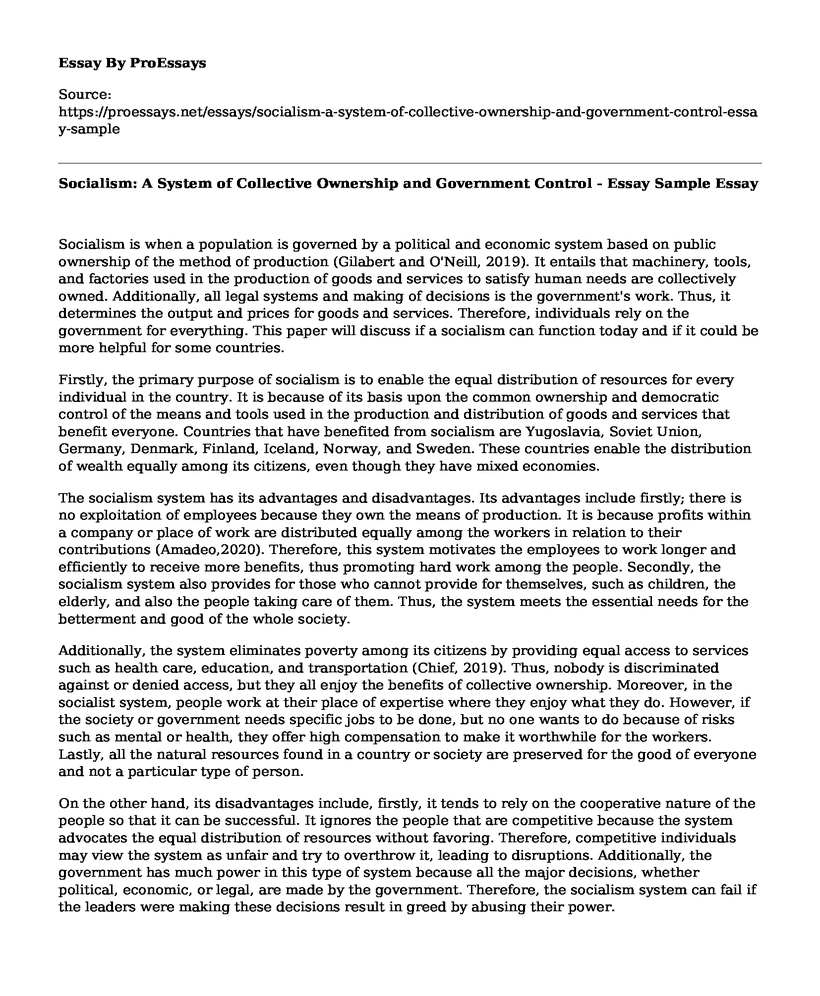Socialism is when a population is governed by a political and economic system based on public ownership of the method of production (Gilabert and O'Neill, 2019). It entails that machinery, tools, and factories used in the production of goods and services to satisfy human needs are collectively owned. Additionally, all legal systems and making of decisions is the government's work. Thus, it determines the output and prices for goods and services. Therefore, individuals rely on the government for everything. This paper will discuss if a socialism can function today and if it could be more helpful for some countries.
Firstly, the primary purpose of socialism is to enable the equal distribution of resources for every individual in the country. It is because of its basis upon the common ownership and democratic control of the means and tools used in the production and distribution of goods and services that benefit everyone. Countries that have benefited from socialism are Yugoslavia, Soviet Union, Germany, Denmark, Finland, Iceland, Norway, and Sweden. These countries enable the distribution of wealth equally among its citizens, even though they have mixed economies.
The socialism system has its advantages and disadvantages. Its advantages include firstly; there is no exploitation of employees because they own the means of production. It is because profits within a company or place of work are distributed equally among the workers in relation to their contributions (Amadeo,2020). Therefore, this system motivates the employees to work longer and efficiently to receive more benefits, thus promoting hard work among the people. Secondly, the socialism system also provides for those who cannot provide for themselves, such as children, the elderly, and also the people taking care of them. Thus, the system meets the essential needs for the betterment and good of the whole society.
Additionally, the system eliminates poverty among its citizens by providing equal access to services such as health care, education, and transportation (Chief, 2019). Thus, nobody is discriminated against or denied access, but they all enjoy the benefits of collective ownership. Moreover, in the socialist system, people work at their place of expertise where they enjoy what they do. However, if the society or government needs specific jobs to be done, but no one wants to do because of risks such as mental or health, they offer high compensation to make it worthwhile for the workers. Lastly, all the natural resources found in a country or society are preserved for the good of everyone and not a particular type of person.
On the other hand, its disadvantages include, firstly, it tends to rely on the cooperative nature of the people so that it can be successful. It ignores the people that are competitive because the system advocates the equal distribution of resources without favoring. Therefore, competitive individuals may view the system as unfair and try to overthrow it, leading to disruptions. Additionally, the government has much power in this type of system because all the major decisions, whether political, economic, or legal, are made by the government. Therefore, the socialism system can fail if the leaders were making these decisions result in greed by abusing their power.
In summary, there are no countries that are entirely run by socialism; however, most have mixed economies. Countries with Norway, Iceland, Finland, Sweden, and Denmark have a robust socialist system (Socialist Countries, 2020). The state which governs on behalf of the people shows how this type of system has been working for them and has been a great success. The government spends a lot on education, housing, and public welfare for its citizens; additionally, many employees are in unions, which gives them higher power, and lastly, the countries are democratic; thus, the people also share in the decision-making (Current Affairs, 2019). Therefore, with all this proof of socialism in these countries, a socialist system can be applied in today's world and could be more advantageous for some countries.
References
Amadeo, K. (2020, January 31). Socialism's Pros and Cons. Retrieved from https://www.thebalance.com/socialism-types-pros-cons-examples-3305592
Chief, E. in. (2019). 15 Democratic Socialism Pros and Cons. Retrieved from https://vittana.org/15-democratic-socialism-pros-and-cons
Current Affairs, N. W. (2019, December). The Data Show That Socialism Works.
Current Affairs. Retrieved from https://www.currentaffairs.org/2019/12/the-data-show-that-socialism-works
Gilabert, P., & O'Neill, M. (2019, July 15). Socialism. Retrieved from https://plato.stanford.edu/entries/socialism/
Socialist Countries 2020. (2019, November 6). Retrieved from http://worldpopulationreview.com/countries/socialist-countries/
Lievesley, H. (2017). Why Socialism Works. Independently Published.
Cite this page
Socialism: A System of Collective Ownership and Government Control - Essay Sample. (2023, Jul 05). Retrieved from https://proessays.net/essays/socialism-a-system-of-collective-ownership-and-government-control-essay-sample
If you are the original author of this essay and no longer wish to have it published on the ProEssays website, please click below to request its removal:
- Modification of Existing Laws Essay
- Paper Example on Nuclear Weapons Should be Eliminated
- Why the President of the US Should Not Be Allowed to Use a Personal Twitter Account
- Spanish Parliamentary Monarchy: A Brief Overview - Essay Sample
- Essay Example on Municipalities: Balancing Local, Provincial and National Interests
- Essay Example on Vaccines: The Key to Lower Mortality & Morbidity Rates
- Addressing Substance Abuse in Schools: Challenges, Interventions, and Comprehensive Policies - Free Report







